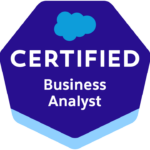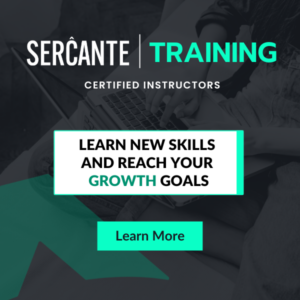Do you have an organized brain, enjoy project managing across multiple stakeholders and departments, love visualizing a process, and want to prove it with a new Salesforce certification? Well, then the Salesforce Business Analyst Certification is the right one for you!
Here is our guide to passing the Salesforce Business Analyst Certification exam. Good luck!
Step 1. Review the Salesforce Business Analyst Exam Guide & Schedule Your Test
Quick reminder that there are no longer any prerequisites for the Business Analyst exam! It is helpful to know or have experience with Salesforce and understand platform functionality and terminology though.
According to the Salesforce Business Analyst exam guide, this certification is “designed for Business Analysts with Salesforce experience. The successful candidate understands business needs, captures requirements, and collaborates with stakeholders to support the development of Salesforce solutions which drive business improvements.”
If you are interested in refreshing your Salesforce skills or earning one of the related certifications first, here are two helpful resources:
- A Pocket Guide to Earning the Salesforce Associate Certification – great for beginners!
- Salesforce Administrator Certification Exam Tips & Tricks

Salesforce Business Analyst Exam Outline
- Customer Discovery: 17%
- Collaboration with Stakeholders: 23%
- Business Process Mapping: 12%
- Requirements: 18%
- User Stories: 18%
- Development Support and User Acceptance: 12%
The exam guide goes into each objective in more detail and also describes the person who is more likely to succeed with this certification (a.k.a. you!).
Schedule Your Exam
Once you have confirmed that this is the certification for you, schedule your test so we have a deadline to study for. Here is the link to make this the easiest step.
Step 2. Organize Your Study Resources
We already established we have well-organized, to-do list, and process-visualization brains so I’ve gone ahead and done the pre-work (Googling) for you to track down our favorite resources, practice tests, and study guides. Plus we’ve included some key topics to revisit based on our experience earning the Business Analyst certification.
Trailheads & Trailmixes
- Salesforce Business Analyst Exam Guide
- Trailmix: Prepare for Your Salesforce Business Analyst Credential
- Module: Salesforce Business Analyst Certification Prep
Blogs
- Salesforce Ben – Salesforce Business Analyst Certification Guide & Tips
- Focus on Force Salesforce Business Analyst Certification Guide
- Automation Champion – How to Pass Salesforce Business Analyst Certification Exam
- How to Pass the Salesforce Business Analyst Certification Exam – Two pages (hard-to-miss arrow on the second page at bottom-ish)
Practice Exams & Courses
This is an essential step for the Salesforce Business Analyst certification! You need to get in the head of the Salesforce test writers to best understand the use cases and user stories they are presenting because at first glance, most of the answers are going to appear correct. However, we want to choose the best process, steps, model, team structure, etc. that matches the specifics of the situation outlined.
- Cert Prep: Salesforce Business Analyst – free, there are good practice questions within the Trailhead modules (not the questions at the end for checking understanding, but these are helpful too)
- Focus on Force Salesforce Business Analyst Certification Practice Quiz and Sample Questions – free
- Focus on Force Salesforce Business Analyst Practice Exams – paid course
- Salesforce Ben – Practice Exam Pack – paid
- Salesforce Certified Business Analyst Exam Actual Questions – free
- Salesforce Certified Business Analyst Exam Practice Test – free, flashcards
- Udemy – The Complete Salesforce Certified Business Analyst Course – paid
Study Groups
Salesforce certifications are difficult. Lucky for us, there are a ton of welcoming communities that we can reach out to for support.
One of our favorites is co-led by one of our own Sercante team members, the Boston Area Community Group with Jordyn Jaffer. This group hosts annual, virtual certification camps that are run completely by attendees. The attendees work together to present different topics each week to help each other prepare for taking the certification. Jordyn says, “ We are in our fourth year of facilitating these and are tackling the Salesforce Advanced Administrator Certification (for the second time!).” Check out their upcoming camps on their Trailblazer Community page here – Boston Women in Tech.
Topics Worthy of a Second Glance
- Know the process chart names and when to best use them based on the use case described. There are specific matches Salesforce will be looking for and there are going to be a lot of lengthy use case and user story questions.
- Understand the order of the four phases of the implementation lifecycle.
- Understand the differences in processes/workstreams, diagrams, and use cases for each of these project management styles – Agile, Kanban, and Scrum.
- Remember what SIPOC stands for and the process order, not necessarily the detailed steps.
- Trailhead: Speak the Process Mapping Language
- The Universal Process Notation (UPN) will come up, so understand the main components of this diagram.
- Trailhead: Understand Universal Process Notation
Step 3. Ready? Pass the Salesforce Business Analyst Certification!
You might never feel ready to take the Business Analyst test – there are endless ways to think about processes and user stories and everything in between. But just like the solutions we are managing and building, there has to be an activation date.
Test-Taking Tips from the Sercante Dragons
- Find Keywords
- These phrases in the questions can indicate the answer or what you can eliminate as an answer.
- Mark Questions for Review & Read Them Carefully
- Always refer back to the full question during or at the end of the exam when you are starting to second guess yourself, there might be something key you missed when you first read it.
- The correct answers for this exam are going to be very order-dependent so make sure you read them slowly.
- Pay Attention to How Questions Answer Each Other
- The use cases being described usually highlight a specific title or department so consider that when choosing the correct answer.
- Think about how they phrased other questions as that might help you focus on the correct answer for a question you were unsure of.
- Don’t Overthink Questions that Seem Easy
- There are going to be a lot of questions that sound the same in this exam – don’t get stuck in a second-guessing loop when the answer seems too simple.
- Using Synonyms of Words Can Help Answer a Question
- For example, “what is the best diagram for this?” One of the correct answers is “the big picture.”
- Have a General Understanding of the Main Salesforce Products
- There will be questions and answers that list actual Salesforce platforms or functionality by name. For example, “your team/client/customer has this problem, which feature/product would help solve this?”
Good luck, you’ve got this!
Share any resources or problem topics in the comments section to help prepare the next group of Salesforce Business Analyst test takers.









